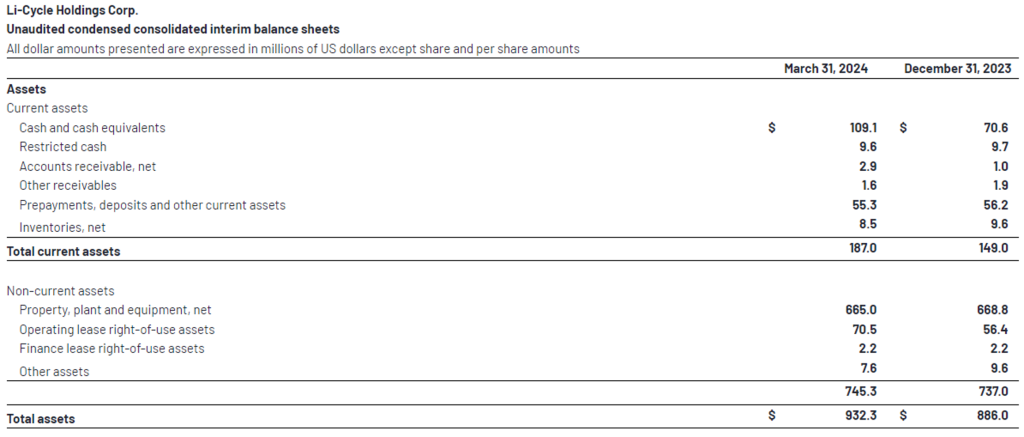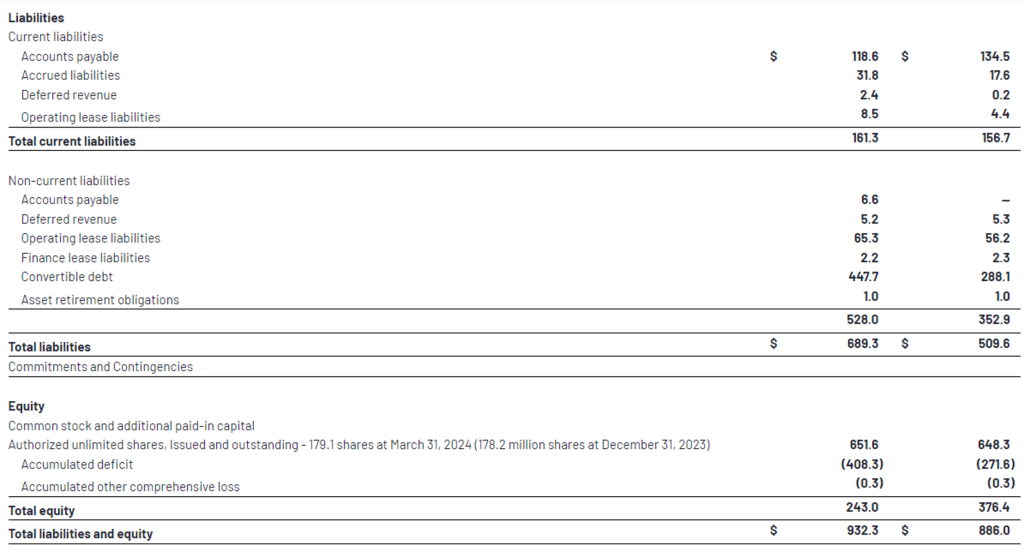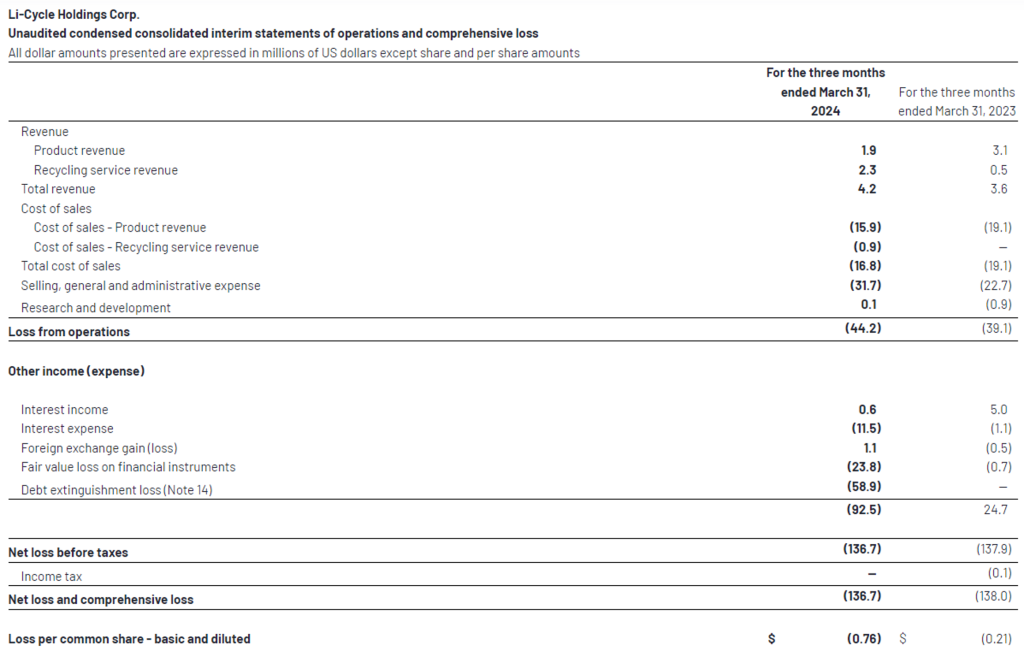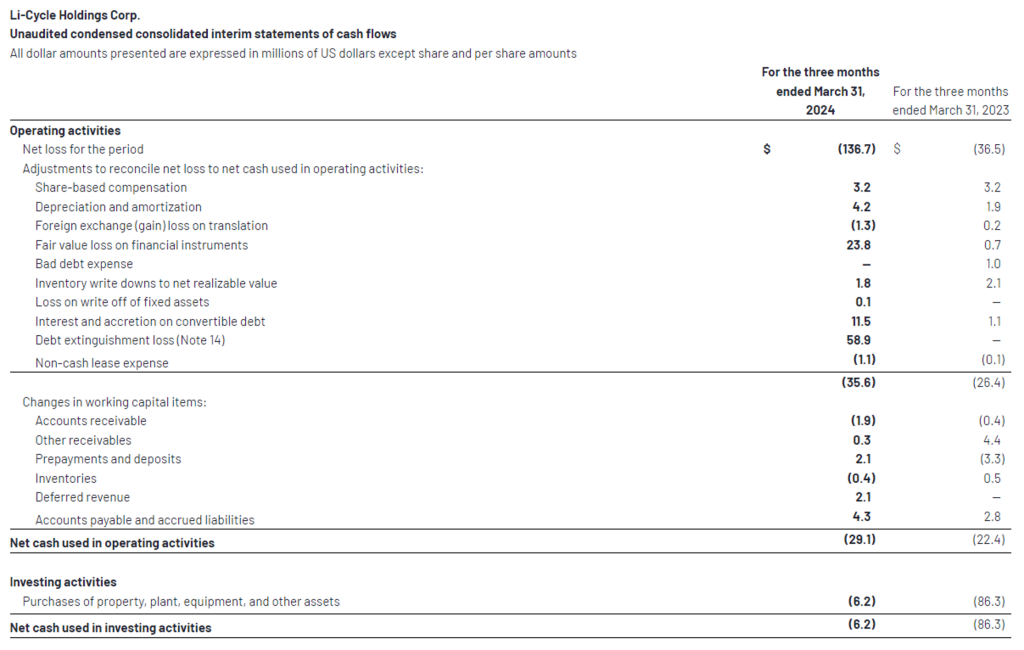
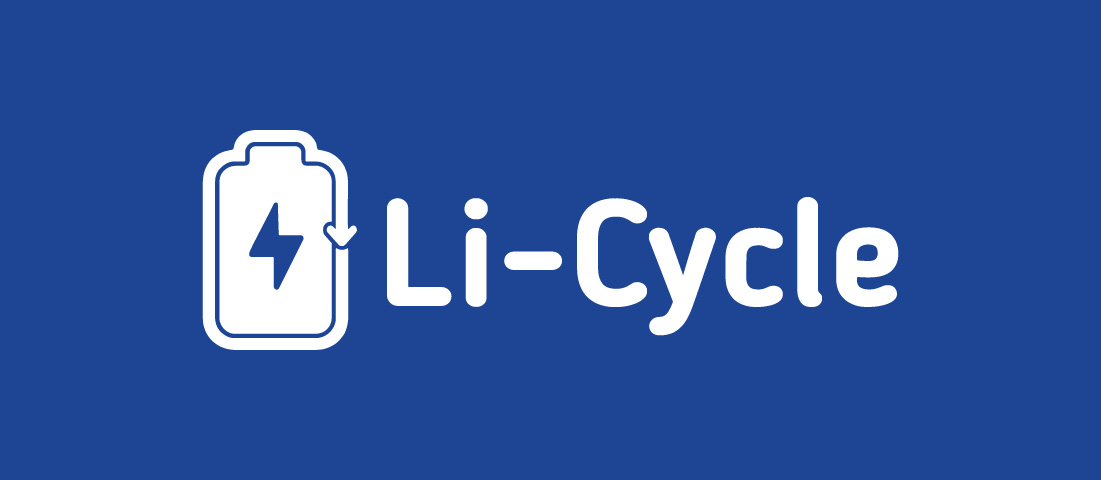


May 10, 2024



Highlights
TORONTO, ONTARIO (May 10, 2024) – Li-Cycle Holdings Corp. (NYSE: LICY) (“Li-Cycle” or the “Company”), a leading global lithium-ion battery resource recovery company, today announced financial results and business updates for its first quarter ended March 31, 2024.
“During the first quarter of 2024, we advanced our comprehensive review of the Rochester Hub go-forward plan and continue to work closely with the U.S. Department of Energy on key technical, financial, and legal workstreams to advance toward definitive financing documentation required for a loan for gross proceeds of up to $375 million,” said Ajay Kochhar, Li-Cycle’s President and CEO. “We also strengthened our commercial partnerships in both North America and Europe which makes us well-placed to be a preferred sustainable recycler in the global battery supply chain.”
Financing and Liquidity
Li-Cycle completed key initiatives during the quarter to enhance its liquidity position, including important interim financing steps as part of its overall funding strategy. The Company has also continued to work closely with the U.S. Department of Energy (DOE) Loan Programs Office on key technical, financial, and legal workstreams to advance toward definitive financing documentation required for closing a loan for gross proceeds of up to $375 million. The Company is also reviewing the potential mixed hydroxide precipitate (MHP) approach for the Rochester Hub with the DOE. On February 7, 2024, the Company received approval from the German state of Saxony-Anhalt for a grant of up to €6.4 million (approximately $6.9 million) for its Germany Spoke. In late April 2024, the Company received the first €5.3 million (approximately $5.8 million) tranche of the grant.
On March 25, 2024, an affiliate of Glencore completed its $75 million investment in Li-Cycle through the purchase of a senior secured convertible note. The investment demonstrates Glencore’s continued endorsement of Li-Cycle and its patented technology and further strengthens the companies’ long-term partnership.
On March 26, 2024, the Company announced a strategic decision to transition from its regional management structure to a centralized model to better position Li-Cycle for future success and increase efficiencies. Li-Cycle also reduced its workforce as part of its Cash Preservation Plan. These steps are expected to generate approximately $10 million in payroll and benefit cost savings on an annualized basis. The Company estimates that it will incur non-recurring charges of approximately $8.3 million in connection with the workforce reductions, mostly in relation to severance payments.
Rochester Hub Project
Li-Cycle progressed the comprehensive review of its Rochester Hub project, including advancing work with the local market to refine go-forward cost estimates for the mixed hydroxide precipitate (MHP) approach. The Company had previously confirmed the technical viability of the MHP process through an internal technical review. The MHP process involves the production of two key products: battery-grade lithium carbonate and MHP, which contains nickel, cobalt, and manganese. Both of these key products have established markets and are critical for the battery supply chain.
Commercial Highlights
The Company strengthened its global commercial partnerships during the first quarter, which provided further validation of Li-Cycle’s sustainable recycling technology and makes us well-placed to be a preferred global recycling partner.
In Europe, the Company signed a new recycling agreement, and expanded and amended two existing agreements, for modules and full-pack batteries with three of the largest automotive EV original equipment manufacturers (OEMs) in the continent. Li-Cycle now has recycling contracts with four of the largest automotive EV OEMs in Europe. The Company also signed a new agreement with a major EV battery supplier and a global battery cell manufacturer in Europe.
In North America, Li-Cycle entered into two new recycling agreements with EV OEMs for full battery packs and extended an existing agreement with a leading battery cell manufacturer.
Review of Q1 2024 Financial Results
Total revenue includes revenue from product sales, recycling services and non-cash fair market value (FMV) pricing adjustments. Revenue from product sales and recycling services, which excludes fair market value pricing adjustments, were $4.6 million compared to $7.7 million in the same period of 2023. The decrease was primarily attributable to lower nickel and cobalt prices and a change in the mix of constituent payable metals in the products sold, partially offset by an increase in recycling service revenue and a higher amount of black mass sold. Total revenues increased 17% to $4.2 million versus $3.6 million in 2023, which was impacted by lower unfavorable FMV pricing adjustment of $0.4 million versus an unfavorable adjustment of $4.1 million in the prior year.
Cost of sales decreased 12% to $16.8 million versus $19.1 million in Q1 2023. Cost of sales attributable to product revenue decreased by $3.2 million or 17% compared to last year as a result of decreased black mass production levels, partially offset by increased operational costs associated with repair and maintenance activities. Cost of sales attributable to service revenue increased by $0.9 million compared to last year due to new service contracts entered into after Q1 2023.
Selling, general & administrative (SG&A) expenses increased to $31.7 million versus $22.7 million in 2023, primarily due to higher non-recurring professional fees related to the Rochester Hub pause and legal fees associated with the Company’s pending litigation of $7.9 million, as well as $5.1 million of severance costs resulting from the workforce reduction announced in March 2024. This was partially offset by lower recurring personnel and other administration costs of $3.7 million.
Other expense was $92.5 million, compared with other income of $2.7 million in the same period last year, primarily due to the debt extinguishment loss of $58.9 million and unrealized fair value loss on financial instruments of $23.8 million relating to the amendment and restatement of the terms of the unsecured convertible notes issued by Li-Cycle to Glencore in 2022.
Net loss was $136.7 million, compared to $36.5 million in 2023, which was primarily due to an increase in other expense as described above.
Adjusted EBITDA1 loss was approximately $27.4 million, compared to an Adjusted EBITDA loss of $37.9 million in 2023. This was largely driven by higher revenue and lower cost of sales, partially offset by higher SG&A expenses. The primary difference between adjusted EBITDA and net loss is the exclusion of the debt extinguishment loss related to the unsecured convertible notes that Li-Cycle issued to Glencore in 2022, unrealized fair value loss on financial instruments and restructuring fees related to the workforce reduction and professional fees related to the Rochester Hub project pause.
The Company incurred capital expenditures of $6.2 million compared to capital expenditures of $86.3 million in the same period last year primarily due to the pause of construction at the Rochester Hub. The capital expenditures consisted of payments made for equipment and construction materials purchased during previous periods for the Rochester Hub and Germany Spoke.
Balance Sheet Position
As of March 31, 2024, Li-Cycle had cash and cash equivalents of $109.1 million, compared to $70.6 million at December 31, 2023. The increase was primarily driven by the proceeds received from the recently completed Glencore senior secured convertible note investment, partially offset by cash used in operating activities.
Webcast and Conference Call Information
On Friday, May 10, 2024, at 8:30 a.m. Eastern Time, Company management will host a webcast and conference call to provide a business update including a review of these results. The related presentation materials for the webcast and conference call will be made available on the investor section of the Li-Cycle website: https://investors.li-cycle.com/overview/default.aspx
Investors may listen to the conference call live via audio-only webcast or through the following dial-in numbers:
Domestic: (800) 343-5419
International: (203) 518-9731
Participant Code: LICYQ124
Webcast: https://investors.li-cycle.com
A replay of the conference call/webcast will also be made available on the Investor Relations section of the Company’s website at https://investors.li-cycle.com.
About Li-Cycle Holdings Corp.
Li-Cycle (NYSE: LICY) is a leading global lithium-ion battery resource recovery company. Established in 2016, and with major customers and partners around the world, Li-Cycle’s mission is to recover critical battery-grade materials to create a domestic closed-loop battery supply chain for a clean energy future. The Company leverages its innovative, sustainable and patent-protected Spoke & Hub Technologies™ to recycle all different types of lithium-ion batteries. At our Spokes, or pre-processing facilities, we recycle battery manufacturing scrap and end-of-life batteries to produce black mass, a powder-like substance which contains a number of valuable metals, including lithium, nickel and cobalt. At our future Hubs, or post-processing facilities, we plan to process black mass to produce critical battery-grade materials, including lithium carbonate, for the lithium-ion battery supply chain. For more information, visit https://li-cycle.com/.
1 Adjusted EBITDA is not a recognized measure under U.S. GAAP. See the Non-GAAP Financial Measures section of this press release for a description of how Adjusted EBITDA is calculated and a reconciliation of Adjusted EBITDA to net income (loss)
Results of Operations Summary1
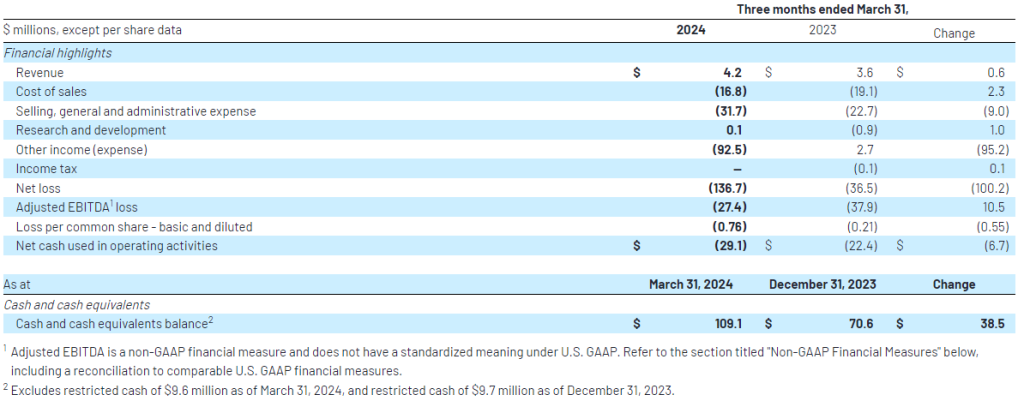
Non-GAAP Financial Measures
Adjusted EBITDA (loss)
Li-Cycle reports its financial results in accordance with accounting principles generally accepted in the United States of America (“U.S. GAAP”). The Company makes references to certain non-GAAP measures, including adjusted EBITDA (loss). These measures are not recognized measures under U.S. GAAP, do not have a standardized meaning prescribed by U.S. GAAP and are therefore unlikely to be comparable to similar measures presented by other companies. Rather, these measures are provided as additional information to complement those U.S. GAAP measures by providing a further understanding of the Company’s results of operations from management’s perspective. Accordingly, they should not be considered in isolation nor as a substitute for the analysis of the Company’s financial information reported under U.S. GAAP.
Li-Cycle defines adjusted EBITDA (loss) as earnings (loss) before depreciation and amortization, interest expense (income), income tax expense (recovery) adjusted for items that not considered representative of ongoing operational activities of the business and items where the economic impact of transactions will be reflected in earnings in future periods. Adjustments relate to fair value loss on financial instruments, debt extinguishment loss and certain non-recurring expenses. Foreign exchange (gain) loss is excluded from the calculation of Adjusted EBITDA. The following table provides reconciliation of net loss to Adjusted EBITDA (loss).
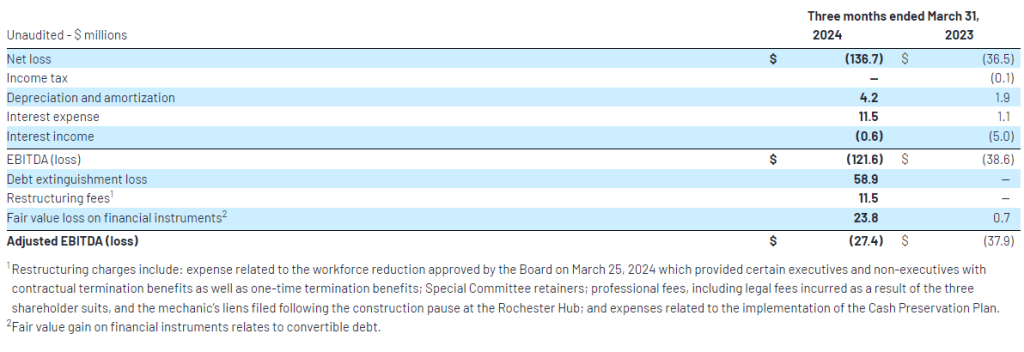
Cautionary Notes – Forward-Looking Statements and Unaudited Results
Certain statements contained in this press release may be considered “forward-looking statements” within the meaning of the U.S. Private Securities Litigation Reform Act of 1995, Section 27A of the U.S. Securities Act of 1933, as amended, Section 21 of the U.S. Securities Exchange Act of 1934, as amended, and applicable Canadian securities laws. Forward-looking statements may generally be identified by the use of words such as “believe”, “may”, “will”, “continue”, “anticipate”, “intend”, “expect”, “should”, “would”, “could”, “plan”, “potential”, “future”, “target” or other similar expressions that predict or indicate future events or trends or that are not statements of historical matters, although not all forward-looking statements contain such identifying words. Forward-looking statements in this press release include but are not limited to statements about: the estimated total charges of approximately $8.3 million in connection with the workforce reduction announced in March 2024 over the next twelve months; the expected approximately $10 million in payroll and benefit cost savings on an annualized basis though the workforce reduction and transition to a centralized model and the expectation that transition to a centralized model will better position the Company for future success and increase efficiencies; . These statements are based on various assumptions, whether or not identified in this communication, including but not limited to assumptions regarding the timing, scope and cost of Li-Cycle’s projects; the processing capacity and production of Li-Cycle’s facilities; Li-Cycle’s ability to source feedstock and manage supply chain risk; Li-Cycle’s ability to increase recycling capacity and efficiency; Li-Cycle’s ability to obtain financing on acceptable terms; Li-Cycle’s ability to retain and hire key personnel and maintain relationships with customers, suppliers and other business partners; general economic conditions; currency exchange and interest rates; compensation costs; and inflation. There can be no assurance that such estimates or assumptions will prove to be correct and, as a result, actual results or events may differ materially from expectations expressed in or implied by the forward-looking statements.
These forward-looking statements are provided for the purpose of assisting readers in understanding certain key elements of Li-Cycle’s current objectives, goals, targets, strategic priorities, expectations and plans, and in obtaining a better understanding of Li-Cycle’s business and anticipated operating environment. Readers are cautioned that such information may not be appropriate for other purposes and is not intended to serve as, and must not be relied on, by any investor as a guarantee, an assurance, a prediction or a definitive statement of fact or probability.
Forward-looking statements involve inherent risks and uncertainties, most of which are difficult to predict and many of which are beyond the control of Li-Cycle, and are not guarantees of future performance. Li-Cycle believes that these risks and uncertainties include, but are not limited to, the following: Li-Cycle’s inability to economically and efficiently source, recover and recycle lithium-ion batteries and lithium-ion battery manufacturing scrap, as well as third party black mass, and to meet the market demand for an environmentally sound, closed-loop solution for manufacturing waste and end-of-life lithium-ion batteries; Li-Cycle’s inability to successfully implement its global growth strategy, on a timely basis or at all; Li-Cycle’s inability to manage future global growth effectively; Li-Cycle’s inability to develop the Rochester Hub as anticipated or at all, and other future projects including its Spoke network expansion projects in a timely manner or on budget or that those projects will not meet expectations with respect to their productivity or the specifications of their end products; Li-Cycle’s history of losses and expected significant expenses for the foreseeable future as well as additional funds required to meet Li-Cycle’s liquidity needs and capital requirements in the future not being available to Li-Cycle on acceptable terms or at all when it needs them; risk and uncertainties related to Li-Cycle’s ability to continue as a going concern; uncertainty related to the success of Li-Cycle’s Cash Preservation Plan and related past and expected near-term further significant workforce reductions; Li-Cycle’s inability to attract, train and retain top talent who possess specialized knowledge and technical skills; Li-Cycle’s failure to oversee and supervise strategic review of all or any of the Li-Cycle’s operations and capital project and obtain financing and other strategic alternatives; Li-Cycle’s ability to service its debt and the restrictive nature of the terms of its debt; Li-Cycle’s potential engagement in strategic transactions, including acquisitions, that could disrupt its business, cause dilution to its shareholders, reduce its financial resources, result in incurrence of debt, or prove not to be successful; one or more of Li-Cycle’s current or future facilities becoming inoperative, capacity constrained or disrupted;, or lacking sufficient feed streams to remain in operation; the potential impact of the pause in construction of the Rochester Hub on the authorizations and permits granted to Li-Cycle for the operation of the Rochester Hub and the Spokes on pause; the risk that the New York state and municipal authorities determine that the permits granted to Li-Cycle for the production of metal sulphates at the Rochester Hub will be impacted by the change to MHP and the reduction in scope for the project; Li-Cycle’s failure to materially increase recycling capacity and efficiency; Li-Cycle expects to continue to incur significant expenses and may not achieve or sustain profitability; problems with the handling of lithium-ion battery cells that result in less usage of lithium-ion batteries or affect Li-Cycle’s operations; Li-Cycle’s inability to maintain and increase feedstock supply commitments as well as secure new customers and off-take agreements; a decline in the adoption rate of EVs, or a decline in the support by governments for “green” energy technologies; decreases in benchmark prices for the metals contained in Li-Cycle’s products; changes in the volume or composition of feedstock materials processed at Li-Cycle’s facilities; the development of an alternative chemical make-up of lithium-ion batteries or battery alternatives; Li-Cycle’s expected revenues for the Rochester Hub are expected to be derived significantly from a limited number of customers; uncertainty regarding the sublease agreement with Pike Conductor Dev 1, LLC related to the construction, financing and leasing of a warehouse and administrative building for the Rochester Hub; Li-Cycle’s insurance may not cover all liabilities and damages; Li-Cycle’s heavy reliance on the experience and expertise of its management; Li-Cycle’s reliance on third-party consultants for its regulatory compliance; Li-Cycle’s inability to complete its recycling processes as quickly as customers may require; Li-Cycle’s inability to compete successfully; increases in income tax rates, changes in income tax laws or disagreements with tax authorities; significant variance in Li-Cycle’s operating and financial results from period to period due to fluctuations in its operating costs and other factors; fluctuations in foreign currency exchange rates which could result in declines in reported sales and net earnings; unfavorable economic conditions, such as consequences of the global COVID-19 pandemic; natural disasters, unusually adverse weather, epidemic or pandemic outbreaks, cyber incidents, boycotts and geo-political events; failure to protect or enforce Li-Cycle’s intellectual property; Li-Cycle may be subject to intellectual property rights claims by third parties; Li-Cycle may be subject to cybersecurity attacks, including, but not limited to, ransomware; Li-Cycle’s failure to effectively remediate the material weaknesses in its internal control over financial reporting that it has identified or its failure to develop and maintain a proper and effective internal control over financial reporting; the potential for Li-Cycle’s directors and officers who hold Company common shares to have interests that may differ from, or be in conflict with, the interests of other shareholders; and risks related to adoption of Li-Cycle’s shareholder rights plan and amendment to the shareholder rights plan and the volatility of the price of Li-Cycle’s common shares. These and other risks and uncertainties related to Li-Cycle’s business are described in greater detail in the sections entitled “Item 1A. Risk Factors” and “Item 7. Management’s Discussion and Analysis of Financial Condition and Results of Operation—Key Factors Affecting Li-Cycle’s Performance” in its Annual Report on Form 10-K and the sections entitled “Part II. Other Information—Item 1A. Risk Factors” and “Part I. Financial Information—Item 2. Management’s Discussion and Analysis of Financial Condition and Results of Operation—Key Factors Affecting Li-Cycle’s Performance” in its Quarterly Reports on Form 10-Q, in each case filed with the U.S. Securities and Exchange Commission and the Ontario Securities Commission in Canada. Because of these risks, uncertainties and assumptions, readers should not place undue reliance on these forward-looking statements. Actual results could differ materially from those contained in any forward-looking statement.
Li-Cycle assumes no obligation to update or revise any forward-looking statements, except as required by applicable laws. These forward-looking statements should not be relied upon as representing Li-Cycle’s assessments as of any date subsequent to the date of this press release.
